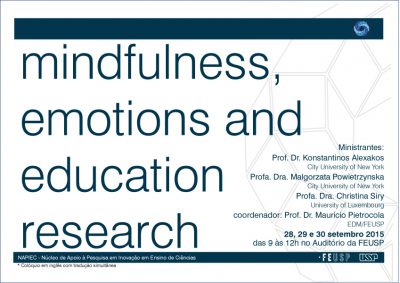Mindfulness, Emotions and Educational Research Colloquium
University of São Paulo, September 28 – 30, 2015
Presentation Proposal
Konstantinos Alexakos, Associate Professor, Brooklyn College, CUNY
&
Małgorzata Powietrzyńska, Research Associate, The Graduate Center, CUNY
Presentation Overview:
We will review our research on emotions and mindfulness in (science) education that has been undertaken with students in undergraduate and graduate teacher education programs at the City University of New York (CUNY). Our research examines ways in which teaching and learning in (science) education are related to the expression of emotions. We investigate relationships between the incidence of various emotions, emotional climate, breathing meditation, and measures of pulse rate and oxygenation of the blood. By undertaking this work and investigating further how emotional energy impacts the practices of teachers and students, we provide a rationale for the use of mindfulness and coteaching heuristics, meditation protocols, and cogenerative dialogue as interventions to understand and minimize undesirable negative emotions in the classroom and produce more positive emotional climates and more desirable states of wellness. Following recent findings, particularly in the fields of neuroscience, cognitive science, developmental psychology, and education, as well as scholarship from contemplative traditions, we argue that attending to people’s socioemotional development is as important as nurturing their cognitive abilities. Indeed, evidence shows that emotional rather than academic development is the best predictor of human life satisfaction. Therefore, we maintain that the aims of education should be expanded to include promotion of practices that enhance well-being of students and teachers in the classrooms and in other fields of social life. To that end, we encourage (science) educators to explore knowledge systems that may be outside of the canons of modern Western science. Jin Shin Juytsu is one such system that, in addition to mindfulness, we have begun to incorporate into our teaching and research practices.
Note: Since the distribution of the material presented across the colloquium modalities is somewhat arbitrary and necessarily artificial, we expect that some ideas in the presentations will re-appear and overlap. Furthermore, rather than being rigid in following this outline, we are open to adjusting the contents of our presentations to the emergent unfolding of the colloquium’s flow based on the suggestions of its participants.
| Morning Seminar | Afternoon Workshop | |
| Day 1 | Multi-Level, Multi-Method, and Multi-Theoretical Research on Emotions and Mindfulness in (Science) Education
Konstantinos Alexakos and Małgorzata Powietrzyńska We will present the logic we apply to our research on emotions and mindfulness. Topics will include authentic and event-oriented inquiry, emergent study designs, multilevel analyses of video and audio files using interpretive approaches that embrace hermeneutic phenomenological methods, conversation and prosodic analysis, analysis of facial expressions, and analysis of embodied emotions and their physiological expression. |
We will present examples of how we incorporated multiple theories and methods to our multi-level research. For example, we will share video clips and other data resources to illustrate application of event-oriented inquiry. We will discuss principles of engaging participants in cogenenerative dialogues and using other techniques towards incorporating multiple meanings (polysemia) and multiple voices (polyphonia) into the analyses and reporting of research findings. We will review our experience with the process of research planning and execution that is grounded in emergent study designs. We will also demonstrate the use of oximetry and the types of data analyses that may be performed. |
| Day 2 | Mindfulness-Based Interventions Towards Promotion of Well-Being in Education and Beyond Małgorzata Powietrzyńska and Konstantinos Alexakos We will discuss theoretical grounding and applications of two mindfulness-based interventions developed and enacted in our on-going studies: breathing meditation and heuristics. |
In this hands-on, interactive workshop, we will further explore mindfulness-based interventions. Participants will engage in and reflect on their experience with a 5-minute breathing meditation practice framed in secular and scientific terms. We will demonstrate and co-engage participants in different breathing meditation techniques including those incorporating Jin Shin Jyutsu holds. Heuristic methodology and its varied applications to teaching, learning, and conducting research will be the focus of this session. Workshop participants will complete one of the mindfulness heuristics and have a discussion around its utility to the classroom environment. They will be encouraged to design their own heuristic that may be appropriate to their unique contexts.
|
Biographies:
Konstantinos Alexakos is an associate professor of science education in the School of Education at Brooklyn College, and the doctoral program of the Learning Science at the Graduate Center, both part of the City University of New York. His interests include the learning sciences with a focus on emotions and teaching and learning as enacted in classroom practices, including emotional bonds and fictive kinships (close personal friendships), co-teaching, radical listening, cogenerative dialogues, emotional climate, breathing and mindful practices, and questions of gender, race and social justice with the goals of improving the learning and teaching of science, personal wellness, and emotional climate in the classroom.
Małgorzata Powietrzyńska is a recent graduate of and a research associate at the PhD program in Urban Education at the Graduate Center of the City University of New York. She has been involved in interpretive research on emotions and mindfulness in education grounded in authentic inquiry.

